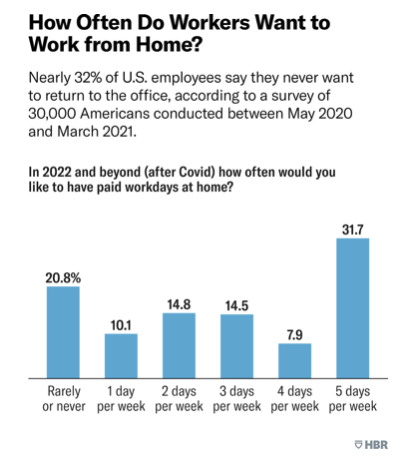
In May of 2021, Harvard Business Review (HBR) published research data showing that 32% of employees never want to return to working in the office. On the other end of the spectrum, 21% of employees told HBR that they never want to work from home.
This is a dilemma facing most companies: what does the future of remote work looks like for employees, and should they return their staffs to a "regular" in-person work environment?
 If you manage people, and you're like most managers, you're balancing several factors as you design your new remote work policies, like costs, efficiency, safety, and the well-being of employees.
If you manage people, and you're like most managers, you're balancing several factors as you design your new remote work policies, like costs, efficiency, safety, and the well-being of employees.
For those who have decided to return to in-person work, managers are given the difficult task of helping their employees return to this "new" work environment.
The Harvard Business Review compiled information from experts who study the role of middle managers and compassion in the workplace.
One of these experts, Jacob Hirsh, an associate professor at The University of Toronto, addresses how these middle managers may feel “stuck.” He says, “ The challenge of a middle manager is to address employee concerns about directions from upper management and help them navigate those decisions.”
For most middle managers that means they have little to no control over how and when the return to work will take place but they still have to manage the transition for their employees.
This added stress of uncertainty on both managers and their employees can cause a lot of anxiety for both parties.

If you're looking for help to extinguish this anxiety among your managers, The Upside has you covered.
In a The Upside article by Homaira Kabir, she lays out tips for managing worry and the perpetual feeling of insecurity, something the pandemic created a lot of.
The top three tips from Kabir are:
1. Break Down Goals: Breaking tasks down into smaller more manageable goals will make the overall goal seem more attainable. Managers can relieve some of their stress by not taking on everything all at once.
2. Fail Fast: It is important to remember trial and error is a natural and beneficial part of any goal. If you focus on getting things perfect the first time, you sacrifice all you can learn about improvement and reaching the best version of your goal.
3. Reward Yourself: Once completing a task it is important to remind yourself that you did something great. Rewarding yourself for a job well done can propel you to create more. Even if it’s just crossing something off of the to-do list, these little rewards can reassure you that you are doing great.
Read through all of Kabir's tips in her article here.
Looking for resources for your employees? Here's another The Upside article that addresses how to cope with anxiety over not knowing whether colleagues are vaccinated and finding it hard to socially distance in the workplace.
